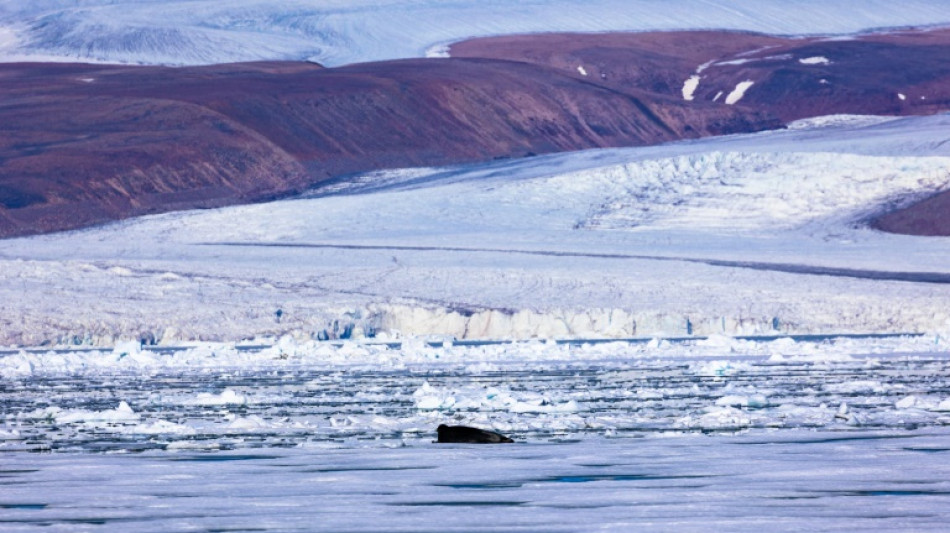
-
 A dip or deeper decline? Guardiola seeks response to Man City slump
A dip or deeper decline? Guardiola seeks response to Man City slump
-
Germany goes nuts for viral pistachio chocolate

-
 EU urges immediate halt to Israel-Hezbollah war
EU urges immediate halt to Israel-Hezbollah war
-
Far right targets breakthrough in Romania presidential vote

-
 Basel votes to stump up bucks to host Eurovision
Basel votes to stump up bucks to host Eurovision
-
Ukraine shows fragments of new Russian missile after 'Oreshnik' strike

-
 IPL auction records tumble as Pant and Iyer snapped up
IPL auction records tumble as Pant and Iyer snapped up
-
Six face trial in Paris for blackmailing Paul Pogba

-
 Olympic champion An wins China crown in style
Olympic champion An wins China crown in style
-
It's party time for Las Vegas victor Russell on 'dream weekend'

-
 Former Masters champion Reed seals dominant Hong Kong Open win
Former Masters champion Reed seals dominant Hong Kong Open win
-
Norris applauds 'deserved' champion Verstappen

-
 Jaiswal and Kohli slam centuries as Australia stare at defeat
Jaiswal and Kohli slam centuries as Australia stare at defeat
-
Kohli blasts century as India declare against Australia

-
 Verstappen 'never thought' he'd win four world titles
Verstappen 'never thought' he'd win four world titles
-
Former Masters champion Reed wins Hong Kong Open

-
 Awesome foursomes: Formula One's exclusive club of four-time world champions
Awesome foursomes: Formula One's exclusive club of four-time world champions
-
Smylie beats 'idol' Cameron Smith to win Australian PGA Championship

-
 Five key races in Max Verstappen's 2024 title season
Five key races in Max Verstappen's 2024 title season
-
Max Verstappen: Young, gifted and single-minded four-time F1 champion

-
 'Star is born': From homeless to Test hero for India's Jaiswal
'Star is born': From homeless to Test hero for India's Jaiswal
-
Verstappen wins fourth consecutive Formula One world title

-
 Survivors, sniffing dogs join anti-mine march at Cambodia's Angkor Wat
Survivors, sniffing dogs join anti-mine march at Cambodia's Angkor Wat
-
Far right eye breakthrough in Romania presidential vote

-
 Jaiswal slams majestic 161 but Australia fight back in Perth
Jaiswal slams majestic 161 but Australia fight back in Perth
-
Edinburgh's alternative tour guides show 'more real' side of city

-
 IPL teams set to splash the cash at 'mega-auction' in Saudi Arabia
IPL teams set to splash the cash at 'mega-auction' in Saudi Arabia
-
Olympics in India a 'dream' facing many hurdles

-
 Wounded Bangladesh protesters receive robotic helping hand
Wounded Bangladesh protesters receive robotic helping hand
-
Majestic Jaiswal 141 not out as India pile pain on Australia

-
 Giannis, Lillard lead Bucks over Hornets as Spurs beat Warriors
Giannis, Lillard lead Bucks over Hornets as Spurs beat Warriors
-
Juan Mata agent slammed as 'cowardly' by angry A-League coach

-
 Marta inspires Orlando Pride to NWSL title
Marta inspires Orlando Pride to NWSL title
-
Palestinian pottery sees revival in war-ravaged Gaza

-
 Main points of the $300 billion climate deal
Main points of the $300 billion climate deal
-
Robertson wants policy change for overseas-based All Blacks

-
 Israel retreat helps rescuers heal from October 7 attack
Israel retreat helps rescuers heal from October 7 attack
-
Afghan women turn to entrepreneurship under Taliban

-
 Mounting economic costs of India's killer smog
Mounting economic costs of India's killer smog
-
At climate talks, painstaking diplomacy and then anger

-
 Uruguayans head to polls with left hoping for comeback
Uruguayans head to polls with left hoping for comeback
-
Trump's mass deportation plan could end up hurting economic growth

-
 Iran director in exile says 'bittersweet' to rep Germany at Oscars
Iran director in exile says 'bittersweet' to rep Germany at Oscars
-
US consumers to bargain hunt in annual 'Black Friday' spree

-
 Cheers, angst as US nuclear plant Three Mile Island to reopen
Cheers, angst as US nuclear plant Three Mile Island to reopen
-
Scientists seek miracle pill to stop methane cow burps

-
 Australia ditches plans to fine tech giants for misinformation
Australia ditches plans to fine tech giants for misinformation
-
Developing nations slam 'paltry' $300 bn climate deal

-
 Red Bulls win 'Hudson River derby' to reach conference final
Red Bulls win 'Hudson River derby' to reach conference final
-
Neuville wins world title after Tanak crashes at Rally Japan


Net zero goal critical to Earth's stability: study
Bringing planet-heating emissions to net zero by 2100 is critical to avoid triggering "tipping points" that could destabilise the systems that keep Earth in balance, a new study said Thursday.
If left unchecked, global warming could set in motion dangerous and irreversible changes to planetary systems such as the disappearance of ice sheets or a collapse of ocean currents.
Researchers said action today would have an influence on the chances of triggering these catastrophic events, even if they are very slow moving and likely to unfold over tens to thousands of years.
"What we do now matters for the next decades, and centuries and even millennia to come," said Nico Wunderling, one of the study's authors from the Potsdam Institute for Climate Impact Research in Germany.
The level of global action on climate change is currently insufficient to avoid the risk of at least one of Earth's critical systems from tipping into collapse.
Global warming is on track to exceed 1.5 degrees Celsius above pre-industrial times -- the cap scientists say must be respected to avert the most disastrous impacts of climate change.
"Permanently exceeding this limit would substantially increase the probability of triggering climate tipping elements," said the study published in the journal Nature Communications.
- 'Unacceptable risk' -
Under the 2015 Paris climate agreement, nearly 200 countries committed to keeping warming "well below" 2C and to strive for the safer goal of 1.5C by the end of the century.
The world is not on track to achieve this.
Even if countries delivered on their existing climate plans in full, the world is on track for 2.5 to 2.9C of warming this century, according to UN estimates.
Researchers wanted to assess what impact global warming above 1.5C might have on "tipping points" and chose to look at four of Earth's key climate systems for this study.
They are the disappearance of the Amazon's primary forest; the collapse of the Atlantic ocean circulation pattern; and the melting of the Greenland and West Antarctic ice sheets.
They found that with every additional 0.1C of warming above the 1.5C target, the likelihood increases that one or more of these four systems irreversibly changes by 2300.
The trend "strongly accelerates" if warming exceeds 2C.
That is an "unacceptable risk to our climate system," Wunderling told AFP.
This underscores the importance of the Paris climate targets "even in case of a temporary overshoot above 1.5C", the study said.
- Take action now -
But even if the world overshoots the 1.5C temperature goal, this tipping risk can be reduced if "warming is swiftly reversed" this century, researchers found.
"The most important thing now is to keep global warming levels as low as possible above 1.5C and then get back to 1.5C as soon as possible, ideally by mid century and at the latest by 2100," Wunderling said.
Researchers said their findings "underscore that stringent emission reductions in the current decade are critical for planetary stability".
"Such a reversal of global warming can only be achieved if greenhouse gas emissions reach at least net-zero by 2100," Wunderling said.
The study concluded that "achieving and maintaining at least net zero greenhouse gas emissions by 2100 is paramount to minimise tipping risk in the long term".
O.Krause--BTB



